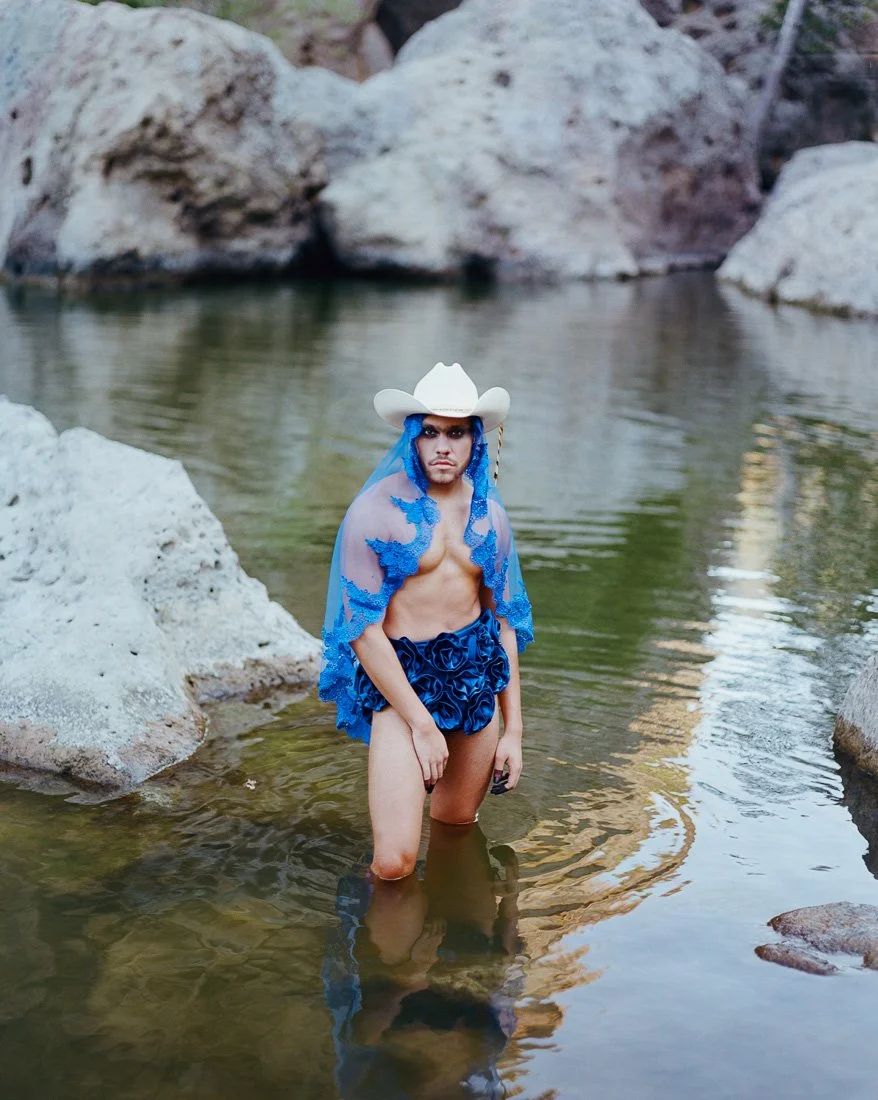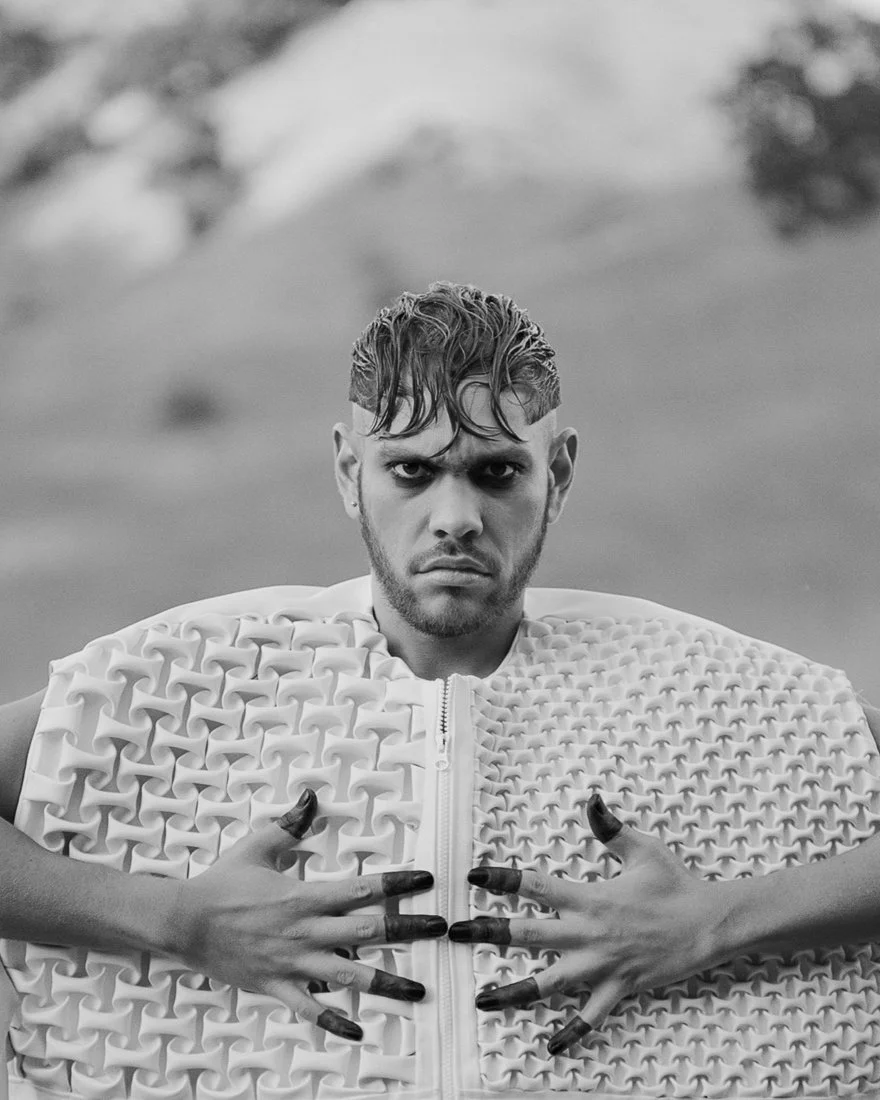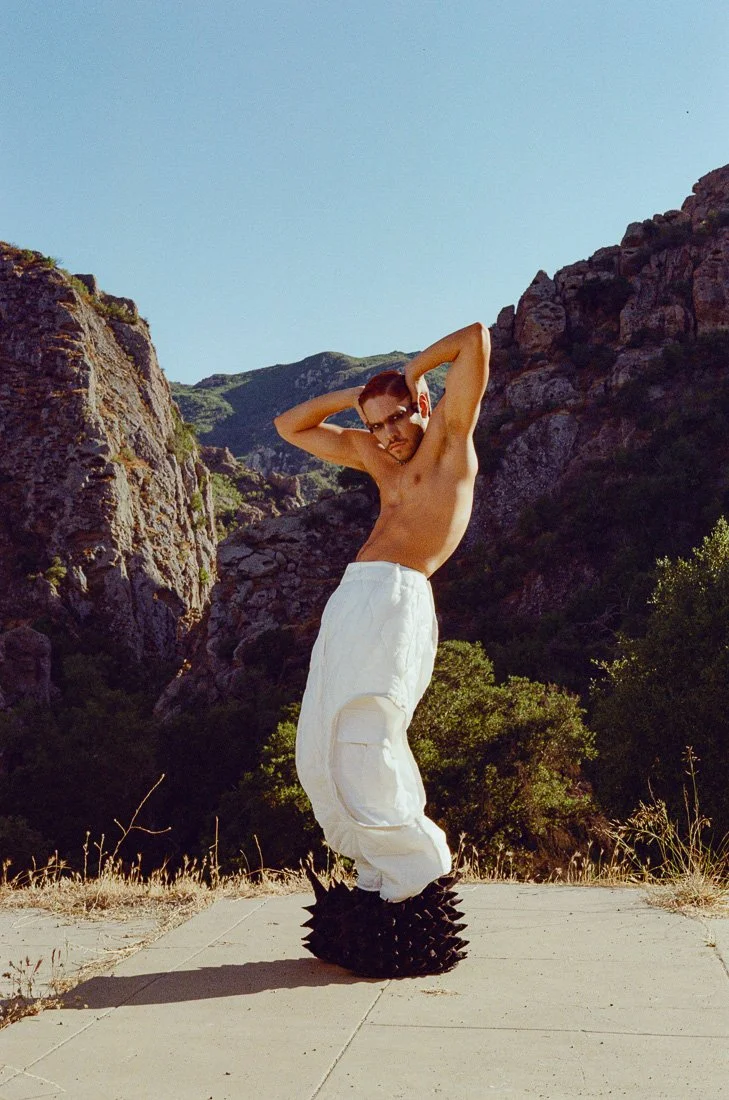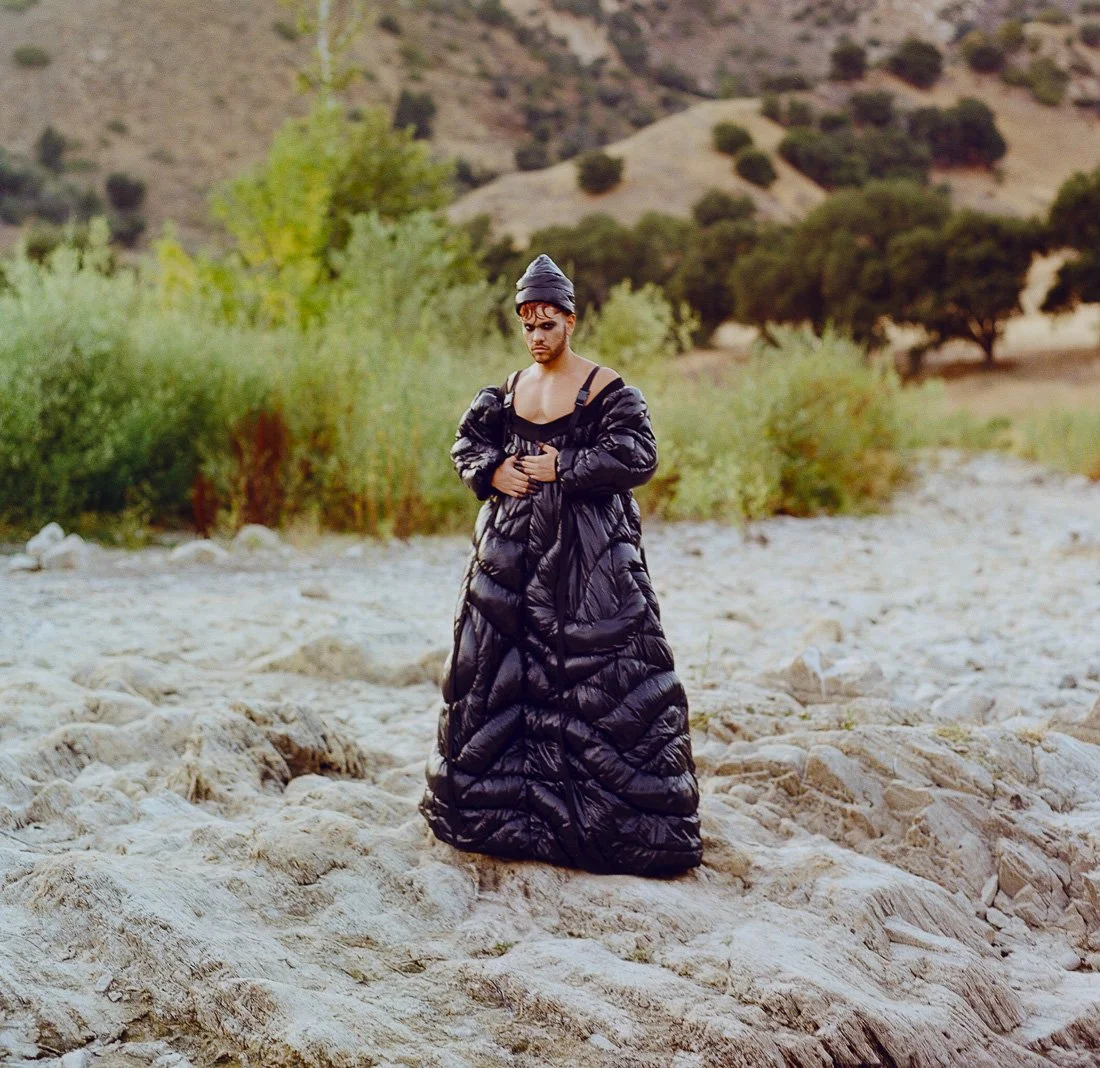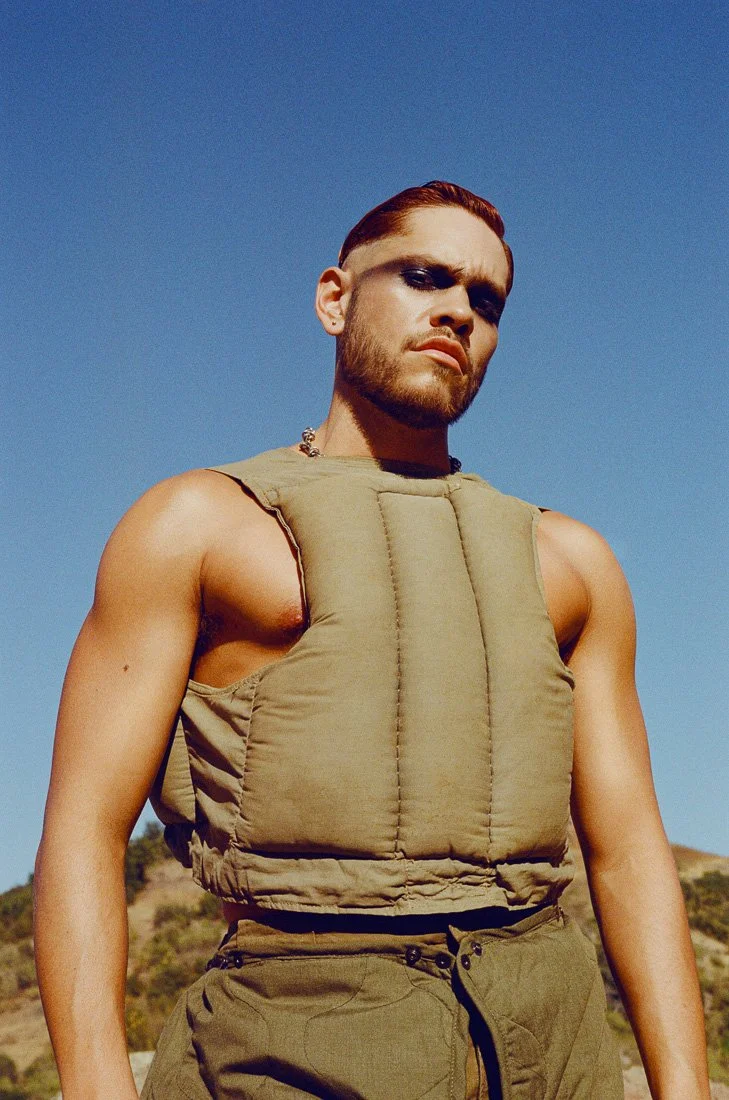Brought up in the sacred sounds of gospel in Kentucky by devout evangelical Protestant Colombian and Nicaraguan parents, it was no surprise when Andrew Padilla picked up a Bluegrass fiddle and fronted an indie Christian worship band, Ecclesia. But what came next for the first-generation U.S. American musician defied the confines of his strict upbringing and paved the way for his current sounds of Kentucky Latin Art-Pop as Cain Culto.
The persona is an homage to his heritage — Cain is an ode to the biblical figure in the Book of Genesis who was the firstborn son of Adam and Eve and murdered his brother Abel out of jealousy. Culto was also chosen for its roots in religion, as in Spanish it directly translates to "worship." It isn't only Christian persons who show up in his lyrics — he also sings about the Hindu goddess Kali.
His hit song "KFC Santeria" is a fusion of sounds from his youth in Kentucky, while homing in on society's overconsumption as a sickness, and utilizes motifs related to the Afro-Caribbean religion. True to himself, the lyrics are "very overt" as he prides himself on stating his political stances with his chest. In the song, he raps, "Fuck Trump, Fuck ICE, Free Palestine."
His next single, "Brujeria," will be released in September. It strays from the heavy rap of the other singles and is more of a pop dance rhythm, but also alludes to Latin American mysticism with visuals of Santa Muerte, the Mexican folk-Catholic feminine deity of death. In this conversation, we discuss the avant-garde performance artist's transformative personal journey, and how his Latinx culture shapes his music.
Lola Méndez: What was your initial foray into music, and how did that evolve into your unique sound and use of instruments?
Cain Culto: I grew up in a music-driven family. My dad is a musician, and in my childhood, there was always music in the house and salsa dancing at all family gatherings. I have so many joyous memories attached to the rhythm and dancing, which is a core part of the sound I create now. I started creating music through the church by leading worship and playing in church bands. My music is so different now — it's got this club aspect to it. It's abrasive and taboo. But I'm confronting the same things that I was always trying to face through spirituality and religion. I'm still creating music that liberates us as a society, and I'm liberating myself as I'm creating it.
I had pursued religious music in an attempt to understand myself. Then, as I understood the institution, I found it was contributing to the trauma I was experiencing as a queer Latino in a very colonized form of religion. My music explores all that lyrically. I'm poking at that institution — at the systems that made me feel like a misfit. I'm confronting it head-on with my lyrics and even the sounds. The instruments I use are all intentional. I'm trying to honor my ancestors and get back to my roots and the Earth.
I'm no longer religious, but I find beauty in mysticism and spirituality. Jesus was a radical, and the stories about him continue to inspire me, particularly in how he positioned himself with the marginalized in society.
SKIRT Vintage
LM: You've had quite the transformative personal journey. You went from being a traveling pastor musician battling with your queerness to pivoting to making music that's more authentic to yourself. What was the turning point when you could no longer suppress your queerness, and Cain Culto emerged?
CC: It was a very dramatic moment in 2019, right before COVID-19. I was touring with my band and doing very extreme religious practices like fasting to try to experience God. The religious institution has many boundaries, and I wanted to have a more experiential connection with the Divine. But because I was still doing so within such a broken framework, it led me into spiritual psychosis. I realized how disconnected I was from my body and that my spiritual practices were dysfunctional. It was a very intense moment where I found myself hospitalized and my mind fully split.
I had to confront myself after I came back to my sanity and acknowledge that whatever got me to this point, I can't keep doing it. That began a really hard pivot away from the institution and to my own path and confronting the parts of myself that I was afraid of such as my queerness, and finding that it wasn't something to be ashamed of or something to reject or repress or to believe was wrong within me, but actually a source of my power and a gift.
LM: That's such a profound experience. How did coming out of the other side influence your transition into Latine Art-Pop?
CC: Even in the church, I was making very upbeat music. When you think of worship music, you think of ballads and ethereal, ambient, heavenly-sounding Coldplay-type of communal music.
BOTTOMS Hiroko Hata, SHOES Hiroko Hata
CC:I always had the instinct to create something more rhythmic, something with more drive, something that made me want to move. I wanted something that reminded me of celebrating with my family in Florida to salsa music. I was so disconnected from my body, so I wanted music that got me into it, and I followed that instinct, and it's in my music now. It's dance music.
LM: Your Latinx and religious roots mesh with your queerness. Then you pepper in influence from your upbringing in Kentucky and Florida — how do you fuse it all together?
CC: On this new record that's gonna be coming out next year, I'm drawing from two main sonic references — Colombian folk music and Appalachian folk music. I grew up in Lexington, Kentucky, and I studied the fiddle and mandolin. I immersed myself in Bluegrass and studied that genre, which was so much fun for me.
I have a spiritual drawing towards drums. I've been hearing it in my head for a long time, as a very earthy, drum-centered percussion music. It was instinctually subconscious, something within myself that I was seeking. Funnily, about a year ago, I was on Spotify looking for Colombian music, and I found this genre called Bullerengue, which is an Afro-Colombian genre of folk drum music with female vocalists. When I heard it, I got chills. It was the sound I've been chasing for so long. It's a historical genre in Colombia, which makes sense, because that's my ancestry. Music is a representation of the spirituality of cultures. Drum music is so powerful. It's what lights me up — it's the spark of music for me. I tie that all within pop music and underground electronic sounds, referencing my queer culture and Florida upbringing.
BOTTOMS Hiroko Hata, SHOES Hiroko Hata
LM: Your music is an extension of your activism. How do your personal experiences with resistance show up in themes in your lyrics?
CC: I've been inspired to create resistance music and music for protest that also carries a core feeling of celebration within it. When you hear "protest" and "resistance," you think of anger and abrasiveness against the oppressor. That's what I'm creating art for, but there's something really powerful when you tap into childlike kinds of inhibitions and freedom. I'm always trying to wrap my work with this joyfulness. A lot of the songs that I'm releasing this year feel celebratory with an aspect of communal chanting and dancing, but when you look at the lyrics, there's a call to action: to resist. It's how I've been able to merge my love for dance music with my passion for activism.
I'm not afraid to be offensive in my lyrics. In the creative process, as I'm writing, I'm overcoming shame. I'm saying things I would've been so afraid to say a year ago. I'm overcoming this feeling of shame through loud, unapologetic sexuality in my music. Sexuality is a source of power and strength, instead of something wrong. Seeing my humanity and my earthiness as a strength. When I perform, I allow myself to feel embodied, sensual, and playful — that is my queerness. As Cain Culto, I feel safe on the stage to be unedited in a way that I wouldn't be day to day. I'm more confident as Cain in many ways — it's helpful to have that alter ego.
LM: You've said that many of your songs start as a visual concept, not necessarily musical. Where do you pull inspiration?
CM: I started as a visual artist, and I've always had inclinations towards fashion — specifically, costuming and wearable sculptural pieces. That's my first love as a creative. So with Cain Culto, the pop project, I knew I wanted fashion and fine art to be part of the pop music. That looks like drawing from my Colombian heritage and the deep history of design and garments. I'm very intentional about how I've referenced that and am always recontextualizing pieces or silhouettes in a new way by queering them, making them fresh and modern, or bringing them into a new space. I'm interested in history, but also the future. As a visual artist, I'm always pursuing this vision of something ancestral and historical that feels like it comes from a time forgotten, brought into something that feels forward and futuristic.
I also love clowning, camp, satire — the absurd, the taboo, the ugly and grotesque. I always tie in a level of humor into my style. These are all concepts I find super inspiring, so I'm communicating that through music. Fashion is important for that; it has to partner well with the sound that I'm creating.
DRESS Buzhi Nedyalkov, HAT Buzhi Nedyalkov
LM: You've shared some little teasers about the new record. What's coming up that you're excited about?
CC: This year, I'll be dropping an EP with five to six songs. This EP is much brighter and has more positivity—a levity— than the later singles on the album. It felt right to lead with that because I wanted to have this energetic punch so the music would feel very activating. Next year, a record will be out, and it will have a couple of standalone singles dropping with some features I'm excited about.
My journey started with embracing feminine perspectives within spirituality. That was the first little step towards liberation for me — getting into feminist theology and traditions. "KFC Santeria" isn't as overt, and people might not catch it, but it was an offering to an Orisha from Santeria named Oya. She's a war goddess and also resides over cemeteries and tornadoes. She embodies a feminine image of transformation and evolution. I was channeling all that into "KFC Santeria," and then with "Kali Ma," the title is more overt. It's about the Hindu deity, Kali, who is a feminist icon. I relate to her journey of transformation, radical rebirth, and relentless pursuit of balance, truth, and justice. All of my singles on this record are a form of veneration of the feminine divine.
We're shooting a music video soon for the next single, and I'm so excited. It's called "Brujeria," and it's kind of a pivot from the last two singles that I've released, which are heavy tracks. This is a pop track, so it's different from the other stuff. It's much more relatable — that's what pop music is. I'm always going to be commenting on things happening in society, but at the same time, I'm also a pop artist. "Brujeria" is about falling in love, sensuality, and dancing at the club. The visuals are going to bring it into this witchy world of Cain Culto. It will have references to Santa Muerte, a feminine deity of death.
LM: As a Latina myself, I see a lot of religion and brujeria woven together. So much of Christianity is so rooted in paganism. Some holidays were literally stolen from animism. In your household, was there any space for the mystic outside of Christianity?
CC: There was so much fear of anything that was not religious or overtly Jesus-centered. In fundamentalism, you're taught that any other way besides the very narrow path that you're given is inherently wrong, evil, broken, and demonic.
My Indigenous ancestors had to survive and keep their practices somewhat alive, hiding their traditions within these Abrahamic, colonized traditions. There's something so beautiful about reconnecting with traditions that ground me in the Earth, in cycles and seasons, and in this world.
If something is true, it's powerful and serves our collective subconscious, inspiring us as humanity; it circles back in one way or another. That's why I love lyricism. I can be very overt. I say my political stances with my chest.
Also, symbolism is powerful. Symbols transcend generations, charged with inspiration that speaks to something so deep within the human subconscious. Symbols come back at the right time. We're at a painful, discouraging moment right now, but symbols carry a lot of power to remind us how to get back on track. I'm always studying symbols, deities, and archetypes that have inspired humanity for generations and considering how I can channel that within myself as a pop artist. ❤
STORY CREDITS
FEATURING Cain Culto, STYLIST Sebastien Hohl, HAIR Omar Alvizo, MAKEUP Kelby Adam, BTS PHOTOGRAPHY Jessie Gaudet, ART DIRECTOR Ana Cecília Mesquita,
TALENT CASTING Muzam Agha, PRODUCER Kristin Steusloff, SPECIAL THANKS BAD Showroom
HERO IMAGE CREDITS
BOTTOMS Samuel Gartner, HAT Stylist’s Own, VEIL Vintage
Read more stories

